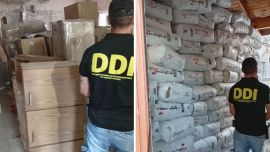The Chamber of Deputies in Mendoza voted a resolution which maintains that “the Mapuches should not be considered original Argentine peoples.”
This resolution comes just days after the Supreme Court suspended the distribution of land in Bariloche to a Mapuche community.
The resolution, which comes from the Rights and Guarantees Committee chaired by José Luis Ramón, has led to a clash between representatives of Cambia Mendoza and the Justicialist (Peronist) Party.
In passing the resolution, the chamber repudiated decree 805/202, which was signed by President Alberto Fernández to suspend "judgments, procedural or administrative acts, whose object is the eviction or vacating of lands.”
The chamber claims the decree “is null and void and was issued against the separation of powers,” and thus challenges the suspension of evictions, as defined by the national government.
However, despite challenging the Mapuches’ indigenous status, the resolution still maintains that it must "guarantee respect for their identity and the right to a bilingual and intercultural education; recognize the legal status of their communities, and the community possession and ownership of the lands they traditionally occupy.”
Kirchnerite and community anger
While the resolution was going to the vote, a demonstration of human rights movements and members of indigenous peoples took place outside the provincial Legislature. The protestors all sung in unison as they criticised the chamber’s actions.
The resolution caused a wave of anger and concern among Patagonian communities.
The Centre of Professionals for Human Rights expressed its "deep rejection of the denialist and racist opinion."
“The (indigenous) communities are part of the homeland. The communities are Argentine. They are people, citizens of this territory whose rights have historically been violated—that is why acknowledgments are now happening in the form of social justice,” a representative of the Frente de Todos caucus stated.
If the resolution passes to the plenary session of the Chamber and becomes law “it would be a very negative precedent because structural racism would be affirmed institutionally,” Gabriel Jofré, a werkén from the Malal Weche community, explained.
The land dispute in the south
This clash occurs as attention is set on the indigenous communities claiming ancestral ownership of lands in the south of Mendoza.
The same kind of dispute is taking place in a number of communities in the southern provinces of the country, such as Neuquén and Río Negro.
Tens of thousands of Mapuches, members of an indigenous people established on both sides of the Andes in the Chilean and Argentine territory, are claiming the return of their ancestral lands and assets.
However, the group is facing quite a bit of backlash from provincial governments.
"All the historical background that we have collected from historians and archaeologists affirm that there were never Mapuches in the south of the province. They are not ancestral communities,"Mendoza Government (Interior), Labour and Justice Minister Víctor Ibáñez, told Perfil.
– TIMES/PERFIL



















Comments